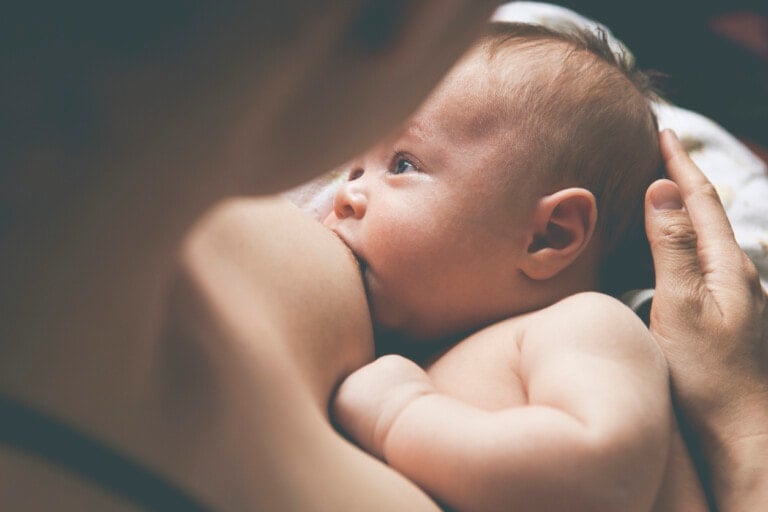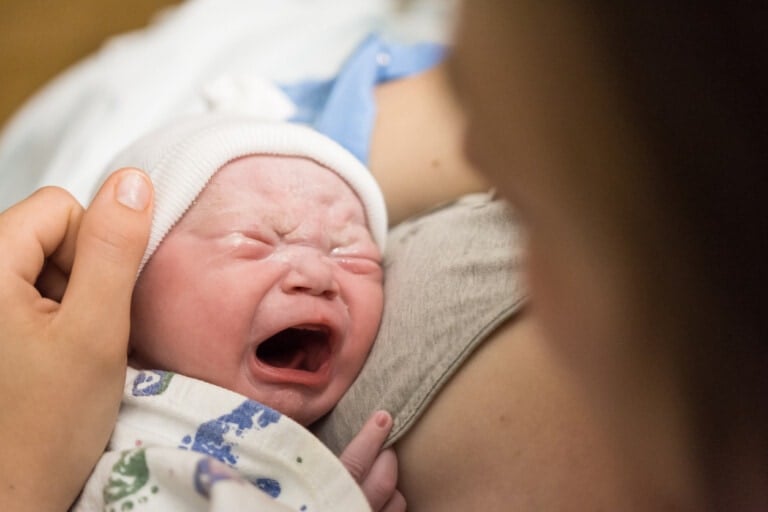When a woman finds out she’s pregnant, things can start to become tailored around her pregnancy and growing baby. We set up prenatal appointments, plan a baby shower, and start thinking about what type of birth we might want to have. But what about the postpartum experience? Why don’t we spend time planning for that?
The truth is, recovering from birth is like its own little world. It can feel heavy, sad, and lonely — while feeling happy, exciting, and memorable at the same time. If you find yourself struggling during those first 42 days after birth, know it’s okay not to be okay postpartum.
What and When Is the Postpartum Period?
The postpartum period begins immediately after childbirth, and it has three distinct phases:1
- The initial or acute phase occurs six to 12 hours after birth.
- The subacute postpartum period lasts two to six weeks.
- The delayed postpartum period can last up to six months.
These are crucial times when moms are in a recovery state after giving birth but also transitioning to their new world with a baby (or babies). Believe it or not, one study shows that at least one out of seven women will experience postpartum depression in the year after giving birth.2 What’s worse is that many of these moms in the trenches typically don’t have the support they need to get help or feel too embarrassed to talk about it.
It’s Okay Not To Be Okay Postpartum
Please, mama, if you’re reading this, remember that it’s okay not to be okay postpartum. Many women report the postpartum period as a type of life crisis. Even though the changes can be positive, the shift is massive and can result in many big feelings. Some key reflections, concerns, or feelings from women in the postpartum period can include things like:4,5
- You aren’t recovering as quickly as you’d like, or you feel uncomfortable with the changes to your body.
- You don’t have the bond you imagined you would with your baby (usually, people assume it will be swift and all-encompassing).
- Nobody understands you.
- You feel frustrated when your baby won’t stop crying.
- You feel exhausted (because, really, you probably are) and need a break.
- Things might be weird or strained with your partner (if you have one) as dynamics shift in your relationship.
- You feel touched out! It’s tough having a baby touching, holding, and feeding constantly. Considering intimacy or being affectionate with other people might also be too much for you.
- You feel lonely, although you are never truly alone with a bub about.
- You’re counting down the minutes to bedtime and miss your sweet bundle of joy all at once.
How To Navigate the Postpartum Period
To help you ease some of that stress and replace it with some confidence throughout your postpartum journey, here are five practical things you can do today:
1. You Can Help Prevent Postpartum Depression
Between physically trying to recover from childbirth to frantically figuring out why your baby won’t stop crying, postpartum is hard. The stress and unknowns can put a damper on your postpartum journey. You may feel a little:4
- Lonely
- Anxious
- Sad
- Depressed
- Enraged
- Overwhelmed
- Worthless
- Withdrawn
- Exhausted (but unable to sleep)
Please know you can turn it all around by educating yourself and emphasizing your personal needs. For example, you can create a postpartum plan before baby arrives to feel more prepared for life with them. However, if you are experiencing signs of postpartum depression, please notify your doctor right away to get the support you need.
2. There Are Treatments Available for Postpartum Depression
Unlike the baby blues, which usually go away on their own by day 14 after birth, postpartum depression likes to stick around or surprise you by showing up later, even up to one year after having your baby. Although the two look similar, postpartum depression symptoms are more intense and can last longer. These symptoms also start to interfere with a mother’s bond with her baby and may impact her ability to care for baby and herself.3 The good news is there are treatment options available (visit SAMHSA) to help you get through it!
Treatment and prevention of postpartum depression fall into two categories: therapy and medication.6 Regardless of which option you need or choose, remember that you’re making a conscious decision to get the help you need, which takes so much courage! By getting help, you are thinking of your family and are a great mom.
3. You Are Not Alone
When I realized I had been dealing with postpartum depression not long after my first was born, I remember feeling so isolated. The one person I knew I could talk to was my husband, but I convinced myself he wouldn’t understand. This, my fellow moms, is why you NEED to surround yourself with a strong support network. This could include other mom friends, family members, postpartum doulas, lactation consultants, etc.
After I eventually started going to therapy, one thing that helped me feel somewhat normal was knowing I wasn’t the only one experiencing these challenges. It felt like a whole new world opened up for me, one where I wasn’t so isolated.
4. You Don’t Have To Do It All Alone
For whatever reason, we moms like to think it’s our sole responsibility to juggle a million things at once. Please don’t feel pressured to subject yourself to that kind of thinking. This is your permission to let things go and give yourself grace because you do not have to DO IT ALL alone.
5. Be Your Biggest Advocate
Nobody knows what you’re going through better than you. Take this time to make your needs clear and heard. Schedule out days in advance so you can fit in some self-care for yourself and ask for help in advance for things like meal prepping, cleaning, or even daily chores.
It’s okay not to be okay postpartum, but there are many ways to help you feel a little more okay and a little more empowered throughout your journey.































